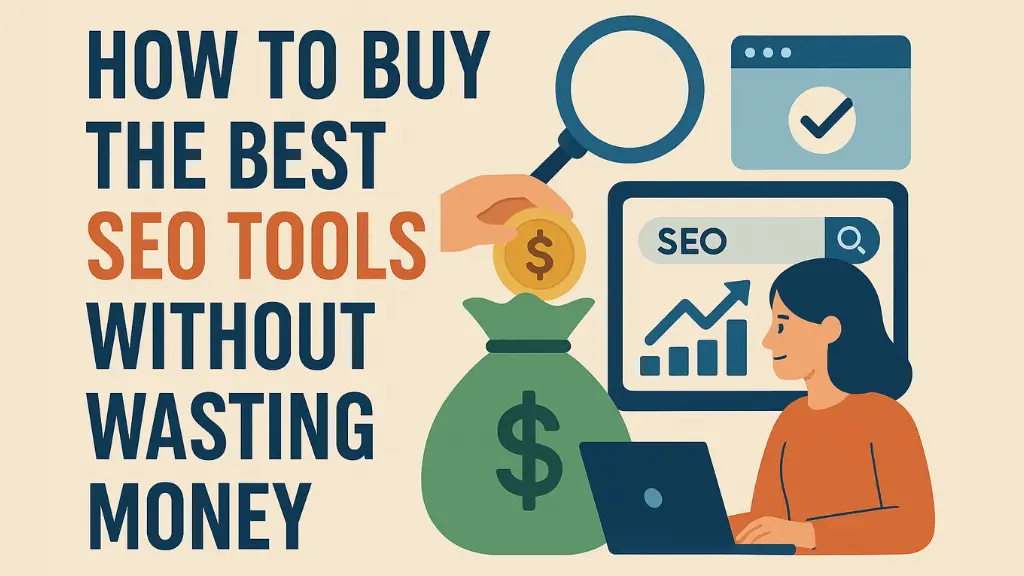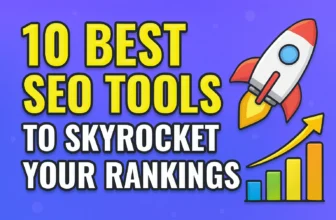
In the ever-evolving world of digital marketing, Search Engine Optimization (SEO) remains a cornerstone for businesses aiming to boost their online presence.
However, with the plethora of SEO tools available, choosing the right ones without overspending can feel like navigating a maze.
The wrong choice can lead to wasted budgets, missed opportunities, and frustration. This comprehensive guide will walk you through the process of selecting the best SEO tools for your needs, ensuring you maximize value and avoid costly mistakes.
By the end, you’ll have a clear roadmap to make informed decisions, saving both time and money.
Understanding Your SEO Needs
Before diving into the world of SEO tools, it’s critical to understand your specific needs. Not every tool is suited for every business, and what works for a large enterprise may be overkill for a small blog. Here’s how to assess your requirements:
1. Define Your Goals
SEO tools serve various purposes, such as keyword research, rank tracking, site audits, backlink analysis, or content optimization. Start by identifying your primary objectives. Are you looking to:
- Improve your website’s ranking for specific keywords?
- Analyze competitors’ strategies?
- Optimize on-page content?
- Monitor backlinks or technical SEO issues?
For example, a small business owner might prioritize affordable keyword research and on-page SEO tools, while an agency may need robust analytics and reporting features for multiple clients.
2. Assess Your Budget
SEO tools range from free to thousands of dollars per month. Determine how much you’re willing to spend monthly or annually.
Keep in mind that investing in the right tools can yield significant returns, but overspending on features you don’t need is a common pitfall.
3. Evaluate Your Team’s Expertise
Some tools require technical knowledge to use effectively, while others are beginner-friendly. If your team lacks SEO expertise, opt for tools with intuitive interfaces and strong customer support. Conversely, advanced users may prefer tools with deeper customization options.
4. Consider Your Website’s Scale
The size and complexity of your website influence the tools you need. A small blog with a few pages may only require basic tools, while an e-commerce site with thousands of products needs comprehensive solutions for technical SEO and content management.
By clearly defining your goals, budget, expertise, and website scale, you can narrow down your options and avoid wasting money on tools that don’t align with your needs.
Key Categories of SEO Tools
SEO tools can be broadly categorized based on their primary functions. Understanding these categories will help you identify which tools are essential for your strategy. Below are the main types of SEO tools and their purposes:
1. Keyword Research Tools
These tools help you identify high-value keywords to target in your content. They provide insights into search volume, competition, and keyword difficulty.
- Examples: Ahrefs Keywords Explorer, SEMrush Keyword Magic Tool, Google Keyword Planner (free).
- Use Case: Ideal for content creators and marketers looking to optimize for organic search.
2. Rank Tracking Tools
Rank trackers monitor your website’s position in search engine results pages (SERPs) for target keywords.
- Examples: Moz Pro, AccuRanker, SEMrush Position Tracking.
- Use Case: Useful for tracking SEO performance over time and measuring campaign success.
3. Site Audit Tools
These tools analyze your website for technical issues, such as broken links, slow page speed, or duplicate content.
- Examples: Screaming Frog, Sitebulb, SEMrush Site Audit.
- Use Case: Essential for diagnosing and fixing technical SEO problems.
4. Backlink Analysis Tools
Backlink tools evaluate your site’s link profile and help you identify opportunities to build high-quality backlinks.
- Examples: Ahrefs Backlink Checker, Majestic, Moz Link Explorer.
- Use Case: Critical for off-page SEO and competitive analysis.
5. Content Optimization Tools
These tools provide recommendations to improve your content’s readability, keyword usage, and overall SEO performance.
- Examples: Surfer SEO, Clearscope, Yoast SEO (for WordPress).
- Use Case: Perfect for bloggers and content marketers aiming to create SEO-friendly content.
6. Analytics and Reporting Tools
Analytics tools track your website’s traffic, conversions, and SEO performance, often integrating with platforms like Google Analytics.
- Examples: Google Analytics (free), Google Search Console (free), SEMrush Analytics.
- Use Case: Necessary for measuring ROI and reporting to stakeholders.
7. All-in-One SEO Platforms
These platforms combine multiple features, such as keyword research, rank tracking, and site audits, into a single tool.
- Examples: Ahrefs, SEMrush, Moz Pro.
- Use Case: Ideal for businesses or agencies managing comprehensive SEO strategies.
Understanding these categories helps you prioritize tools based on your specific needs, avoiding overlap and unnecessary expenses.
How to Evaluate SEO Tools
With hundreds of tools available, evaluating them effectively is key to avoiding wasteful spending. Here’s a step-by-step process to assess SEO tools:
1. Research and Compare Features
Create a shortlist of tools in the categories relevant to your needs. Compare their features, focusing on:
- Core Functionality: Does the tool excel in the specific area you need (e.g., keyword research or backlink analysis)?
- Ease of Use: Is the interface intuitive? Are there tutorials or support resources?
- Integration: Does the tool integrate with other platforms you use, like Google Analytics or WordPress?
- Scalability: Can the tool grow with your business as your needs evolve?
2. Check Pricing and Value
SEO tools vary widely in cost. Some offer free plans with limited features, while others have tiered pricing based on usage. Evaluate:
- Free Trials: Most premium tools offer free trials or limited free plans. Test them to ensure they meet your needs.
- Pricing Tiers: Check if the tool’s pricing aligns with your budget and if higher tiers offer meaningful additional features.
- Hidden Costs: Be aware of add-ons, such as extra user seats or API access, that could increase costs.
3. Read Reviews and Case Studies
User reviews and case studies provide insights into a tool’s real-world performance. Look for:
- Reliability: Does the tool deliver accurate data and consistent performance?
- Customer Support: Is support responsive and helpful?
- Success Stories: Have businesses similar to yours achieved results with the tool?
4. Test Data Accuracy
SEO tools rely on data, but not all data is equal. During free trials, compare the tool’s data with trusted sources, like Google Analytics or Search Console, to verify accuracy.
5. Assess Customer Support and Community
Reliable customer support can make or break your experience with an SEO tool. Look for:
- Support Channels: Email, live chat, or phone support.
- Documentation: Comprehensive guides, tutorials, or webinars.
- Community: Active user forums or communities for peer support.
By thoroughly evaluating tools based on these criteria, you can avoid investing in subpar or redundant solutions.
Top SEO Tools to Consider in 2025
Below is a curated list of some of the best SEO tools available in 2025, based on their features, pricing, and user feedback. This list includes both free and paid options to suit various budgets.
1. Ahrefs
- Category: All-in-one SEO platform
- Key Features: Keyword research, backlink analysis, site audits, rank tracking, and competitor analysis.
- Pricing: Starts at $99/month (Lite plan).
- Pros: Comprehensive data, user-friendly interface, excellent backlink analysis.
- Cons: Expensive for small businesses, limited free plan.
- Best For: Agencies and businesses with advanced SEO needs.
2. SEMrush
- Category: All-in-one SEO platform
- Key Features: Keyword research, site audits, rank tracking, content optimization, and PPC analysis.
- Pricing: Starts at $119.95/month (Pro plan).
- Pros: Robust feature set, great for competitor analysis, integrates with Google Analytics.
- Cons: Steep learning curve for beginners, higher cost for advanced features.
- Best For: Marketers and agencies managing multiple campaigns.
3. Moz Pro
- Category: All-in-one SEO platform
- Key Features: Keyword research, rank tracking, site audits, and link analysis.
- Pricing: Starts at $99/month (Standard plan).
- Pros: Beginner-friendly, strong community, reliable data.
- Cons: Less comprehensive backlink data compared to Ahrefs.
- Best For: Small to medium-sized businesses.
4. Google Keyword Planner
- Category: Keyword research
- Key Features: Keyword suggestions, search volume, and cost-per-click data.
- Pricing: Free (requires a Google Ads account).
- Pros: Free, reliable data directly from Google.
- Cons: Limited features, primarily designed for PPC campaigns.
- Best For: Budget-conscious beginners.
5. Screaming Frog SEO Spider
- Category: Site audit
- Key Features: Crawls websites to identify technical SEO issues like broken links, duplicate content, and redirects.
- Pricing: Free (limited to 500 URLs); paid version at ~$259/year.
- Pros: Detailed technical analysis, affordable paid version.
- Cons: Requires technical knowledge, desktop-based.
- Best For: Technical SEO professionals.
6. Surfer SEO
- Category: Content optimization
- Key Features: Content editor, keyword research, SERP analysis, and content audits.
- Pricing: Starts at $59/month (Basic plan).
- Pros: Excellent for on-page SEO, integrates with Google Docs and WordPress.
- Cons: Limited features for off-page SEO.
- Best For: Content creators and bloggers.
7. Google Search Console
- Category: Analytics and reporting
- Key Features: Tracks search performance, identifies indexing issues, and provides keyword data.
- Pricing: Free.
- Pros: Free, authoritative data, easy to use.
- Cons: Limited to Google-specific data, no competitor analysis.
- Best For: All website owners.
8. Ubersuggest
- Category: All-in-one SEO platform
- Key Features: Keyword research, site audits, rank tracking, and competitor analysis.
- Pricing: Free plan available; paid plans start at $29/month.
- Pros: Affordable, beginner-friendly, generous free plan.
- Cons: Less robust data compared to premium tools.
- Best For: Small businesses and startups.
This list is not exhaustive, but it covers a range of tools for different needs and budgets. Always test tools during free trials to ensure they align with your goals.
Strategies to Save Money on SEO Tools
Investing in SEO tools doesn’t have to break the bank. Here are proven strategies to maximize value and minimize costs:
1. Start with Free Tools
Free tools like Google Keyword Planner, Google Search Console, and Ubersuggest offer valuable insights for beginners or those with limited budgets. Use these to establish a baseline before investing in premium tools.
2. Take Advantage of Free Trials
Most premium tools offer free trials (typically 7-14 days). Use this period to test features thoroughly. Create a checklist of must-have features and evaluate whether the tool meets them.
3. Opt for Annual Plans
Many tools offer discounts (up to 20%) for annual subscriptions compared to monthly billing. If you’re confident in a tool’s value, committing to a yearly plan can save money.
4. Avoid Overlapping Features
Using multiple tools with similar features can lead to redundant costs. For example, if you use Ahrefs for backlink analysis, you may not need Majestic. Choose all-in-one platforms like SEMrush or Ahrefs to consolidate functionality.
5. Share Subscriptions
For agencies or teams, consider tools that allow multiple user seats under one subscription. This is often more cost-effective than purchasing individual licenses.
6. Negotiate Enterprise Plans
If you’re a large business or agency, contact tool providers to negotiate custom pricing for enterprise plans. Many offer discounts for high-volume users.
7. Monitor Usage
Regularly review your tool subscriptions to ensure you’re using all features. If you’re paying for advanced features you don’t need, downgrade to a lower tier.
8. Leverage Discounts and Promotions
SEO tool providers often run promotions during events like Black Friday. Keep an eye on their websites or subscribe to newsletters for deals.
By implementing these strategies, you can significantly reduce costs while still accessing powerful SEO tools.
Common Mistakes to Avoid
Even with careful planning, it’s easy to fall into traps when purchasing SEO tools. Here are common mistakes to steer clear of:
1. Chasing the Cheapest Option
While budget tools are tempting, they may lack accuracy or essential features. Investing in a reliable tool often yields better long-term results.
2. Buying Tools You Don’t Understand
Complex tools like Screaming Frog or Ahrefs can be overwhelming without proper training. Ensure your team has the skills to use the tool effectively.
3. Ignoring Scalability
A tool that works for a small site may not suffice as your business grows. Choose tools that can scale with your needs to avoid frequent switching.
4. Overlooking Customer Support
Poor support can leave you stuck when issues arise. Prioritize tools with responsive customer service and robust documentation.
5. Falling for Hype
Marketing buzz around “must-have” tools can lead to impulsive purchases. Always test tools and verify their value for your specific needs.
6. Neglecting Free Tools
Free tools like Google Search Console are often underutilized. They can provide significant value, especially when paired with paid tools.
Avoiding these pitfalls ensures you invest in tools that deliver results without wasting resources.
Building a Cost-Effective SEO Tool Stack
A well-rounded SEO tool stack combines free and paid tools to cover all aspects of your strategy. Here’s an example of a cost-effective stack for a small business with a $100/month budget:
- Keyword Research: Google Keyword Planner (free) for basic keyword data, supplemented by Ubersuggest ($29/month) for deeper insights.
- Site Audits: Screaming Frog (free for up to 500 URLs) for technical analysis.
- Content Optimization: Surfer SEO ($59/month) for on-page optimization.
- Analytics: Google Search Console (free) for performance tracking.
Total Cost: $88/month
For agencies or larger businesses, an all-in-one platform like Ahrefs or SEMrush ($99-$119/month) may replace multiple tools, streamlining workflows and reducing costs.
Staying Updated with SEO Tool Trends
The SEO landscape evolves rapidly, and so do the tools. To ensure your investments remain relevant:
- Follow Industry Blogs: Sites like Search Engine Journal, Moz Blog, and Ahrefs Blog provide updates on new tools and features.
- Join Communities: Engage in forums like Reddit’s r/SEO or X’s SEO communities for real-time insights.
- Attend Webinars: Many tool providers offer free webinars showcasing updates and best practices.
- Reevaluate Annually: Review your tool stack yearly to ensure it aligns with your current needs and industry trends.
By staying informed, you can adapt your toolset to leverage new technologies and avoid outdated solutions.
Conclusion
Choosing the best SEO tools without wasting money requires careful planning, research, and a clear understanding of your needs.
By defining your goals, evaluating tools based on features and value, and leveraging free trials and discounts, you can build a cost-effective SEO tool stack that drives results.
Avoid common mistakes like chasing cheap options or buying tools you don’t understand, and regularly reassess your tools to stay aligned with your business goals.
With the right tools in your arsenal, you’ll be well-equipped to boost your website’s performance, outrank competitors, and achieve sustainable growth—all without breaking the bank.







[…] Code: The theme’s optimized code ensures fast loading times, a key factor in SEO and user […]